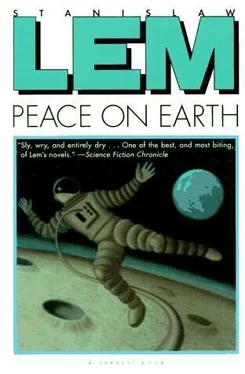It was not a pretty sight. The boulder that had served me as a shield was split into large pieces and those were covered with a network of hairline cracks. My legs or rather what remained of them were stuck in rubble. The poor remote was an armless, legless torso. I had the eerie sensation that my head was on the moon and my body was on the ship, because even as I saw the battlefield under the black sky, I felt the seat and shoulder belts of my chair. The chair was with me yet not with me because I couldn’t see it. It wasn’t hard to figure out the reason: the remote’s sensors, without incoming data, shut down so I remained in contact only with the head which, protected by the helmet, had survived the murderous moonquake caused by the spider. Nothing more for me to do here, I thought. But I stayed, half in half out of the rubble, and looked over the sunlit field.
In the distance something was flapping in the sand, sluggishly, like a fish on a beach. One of the lizard robots. Sand rolled off its back as it hauled itself into a sitting position like a kangaroo or dinosaur, and it sat there, the last witness of a battle that no one won. The robot turned toward me and suddenly began to spin, and spun so fast, the centrifugal force made its long tail fly off. I watched, amazed, while it whirled now like a top, until pieces flew in all directions and it fell flat, flopped over a few times, and with a final somersault landed on the other bodies and was still. Although I had attended no lecture on the theory of electronic expiring, I knew that this was what I had just seen, it was so like the death spasms of a crushed beetle or caterpillar. We know how their death looks but cannot know if those last spasms signify suffering. I had had enough of this. I felt, in a way difficult to describe, that I was involved in it, even responsible. But because I hadn’t come to the moon to philosophize on moral questions, I bit down hard to disconnect myself from the pitiful remnant of LEM 3 and in the blink of an eye was back on board to tell Control what had happened this time.
Tarantoga, to whom I showed these notes, said that I describe all who worked on my mission and kept watch over me as either idiots or bunglers. Whereas the General Theory of Systems proves mathematically that there exists no element or part that is infallible, and even if you reduce fallibility to one in a million, in other words provide that a given part will break down only once in a million times, a system containing a million parts must fail because one of the million will fail. But the lunar system I belonged to was made up of not one but eighteen million components, therefore the idiot bungler responsible for the majority of my problems was the world, because if all the experts stood on their heads and were geniuses every one, the situation could only be worse, never better. Probably true. On the other hand, I was the one who suffered as a result of all those unavoidable breakdowns, and anyway psychologically, when you’re in a fix, you don’t curse the atoms or electrons but specific individuals so my radio tantrums were also unavoidable.
Control pinned their hopes on the last LEM because it was a miracle of technology and guaranteed the maximum safety. It was a remote in powdered form. Instead of a steel athlete you had a container filled with microscopic grains, each grain of such concentrated intelligence it rivaled a supercomputer. In the presence of certain impulses these particles came together to form a LEM. I could land as a thin cloud of molecules, could coalesce if necessary in the form of a robot of human shape, but I could just as easily become one of forty-nine other programmed things, and even if eighty-five percent of the grains were destroyed, the rest would be enough to carry on. The science behind such a remote, called a dispersant, was so advanced that Einstein, von Neumann, the entire physics department of M.I.T., and Rabindranath Tagore working together would have had a problem with it, so I didn’t even try to figure it out. All I knew was that they’d embodied me in thirty billion separate particles, particles more versatile than the cells of a living organism, and there was unimaginable redundancy for joining these in various combinations which could all be turned back to dust at the push of a button, dust so scattered you couldn’t see it, and each particle incorporating stealth technology, making it undetectable by radar or laser or anything except gamma rays. If I was ambushed I could disperse myself, retreat, and reform in whatever way I liked. What one experiences as a cloud spread over several thousand cubic feet is impossible to put into words. To know it, you have to be such a cloud. If I lost my vision, or to be more precise my optical sensors, I could replace them with any other organ, and the same for arms, legs, tentacles, tools. I just had to be careful not to become lost in the wealth of possibilities. This time, I would have only myself to blame if I failed. The scientists thus washed their hands of responsibility if the remote malfunctioned. I can’t say this made me happy.
I landed at the equator on the other side of the moon, smack in the middle of the Japanese sector, as a centaur, that is as a being with four extremities plus two arms attached to the upper trunk, with an additional device that surrounded me like an intelligent gas, so actually there was not much resemblance to the mythological creature. Even though I had familiarized myself with this powdered remote too at the Lunar Agency’s testing range, I first crawled into the bay to check it out. It was indeed fascinating to watch that pile of glittering powder begin to move when you turned on a program, and flow, and connect, and mold itself to make the given shape, and how when you turned off the field (electromagnetic or possibly something else), it flew apart like a kicked sand castle. This ability to fly apart at any moment was supposed to make me feel secure. The sensation was quite unpleasant, like a strong vertigo combined with the shakes, but there was nothing I could do about that. At least it only lasted until I assumed a new form. The one thing that could destroy me was a thermonuclear explosion and even that had to be up close. I asked if it was possible for me to disperse completely due to a malfunction but they never gave me a straight answer. As an experiment I tried to run two programs at once, becoming at the same time a humanoid giant and a nine-foot caterpillar with a flattened head and enormous pincers, but it didn’t work because the selector worked on an either/or principle.
This time I stood on lunar soil without the rear guard of the micropes, because I was myself in a sense a multitude of eyes, pulling after me a flowing gauzy train of transmitters. Possessing an inquiring mind, I had asked what would happen if it turned out that similar protean robots had been developed on the moon. They couldn’t answer that though on the testing range they had pitted two, even three such robots against each other, which mixed like clouds going in different directions. The clouds preserved ninety percent of their identity. Ninety percent of an identity is probably also something you have to experience to understand. This reconnaissance, at any rate, started without any trouble. I trotted forward, not even having to turn my head because I could see on all sides at once, the rear included, like a bee, which has round eyes and sees out of thousands of ommatidia at the same time.
The way that the individual nations programmed their weapon factories was known only to them, but from the Japanese particularly, famous for their ingenuity, I expected unpleasant surprises. Professor Hakagawa, a member of our team at Control, had no more idea than any of us what monsters the Japanese computers might hatch, but he warned me to stay on my toes and not be taken in by appearances. Not knowing how to tell appearance from reality, I cantered across the monotonous, flat terrain. At the horizon rose the embankment of a large crater, and Wivitch, Hakagawa, and the rest of them were delighted with the picture relayed to Earth by the Trojan satellites because it was razor-sharp. After an hour I observed some low shoots among the rocks and in the sand, and they turned in my direction. They looked like the withered leaves of potato plants. I asked if I should pull up a clump, but nobody wanted to make the decision for me, some said I definitely should and others said I’d better not. I leaned my centaur’s body over one of the larger plants and tried to pick a pliant stem. Nothing happened, so I lifted it to my eyes. It began writhing like a snake and coiled itself tight around my wrist, but after trying a couple of things I discovered that if you stroked it lightly, like tickling with a finger, it let go. I felt stupid addressing potato leaves though I knew this had nothing to do with the vegetable kingdom, but I gave it a try anyway. There was no answer, not that I expected one. I shook off the tendrils, which squirmed like worms, and galloped on. The area looked like a poorly kept garden, a bucolic scene, but I was prepared for an attack at any moment and even provoked those pseudoplants, stepping on them with my hooves (which are what my boots looked like; had I wanted, I could have made them cloven hooves). Then I came to a patch of another dead vegetable, in long rows, and before each row stood a large sign with the words STOP! HALT! ARRÊTE! and so on in some twenty tongues including Malay and Hebrew. Despite this I plunged ahead into the field. Farther on, tiny pale-blue flies swarmed in circles near the ground, and when they saw me they arranged themselves into the letters DANGER! OIIACHOCTb! GEFAHR! PERÌCOLO! YOU ARE ENTERING JAPANESE PINTELOU! I Called Control, but no one, not even Hakagawa, knew what PINTELOU meant. I encountered my first problem, because when I pushed through these trembling letters they stuck to me and began crawling over my body like ants. They did me no harm, however. I flicked them off with my tail (showing its usefulness for the first time) and ran down a furrow between two patches until I came to the edge of the crater. The plants continued into a gully and on, deeper, into a wide ravine, its bottom hidden in moon shadow as black as coal.
Читать дальше












